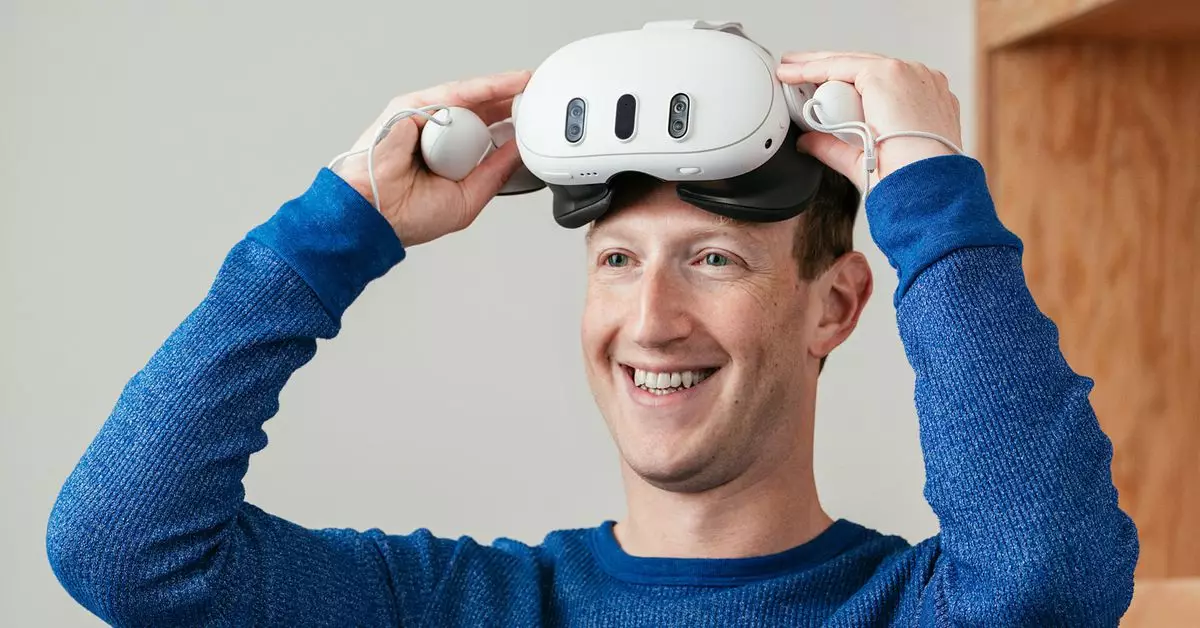When it comes to virtual reality headsets, the competition is fierce. Apple’s Vision Pro and Meta’s Quest 3 are two of the latest contenders in this rapidly evolving market. In a recent video posted on Instagram, Meta CEO Mark Zuckerberg shared his thoughts on the Vision Pro, confidently asserting that the Quest 3 is not only a better value but also a superior product overall.
Zuckerberg wastes no time in highlighting one of the key tradeoffs made by Apple to achieve its impressive display in a wearable form factor – weight. The Vision Pro is noticeably heavier than the Quest 3, weighing in at 120 grams more. This additional weight can make the Vision Pro less comfortable to wear for extended periods, potentially limiting its usability for longer VR experiences. In comparison, the lighter Quest 3 may provide a more comfortable fit, allowing users to delve deeper into virtual worlds without any discomfort.
Another advantage that Zuckerberg attributes to the Quest 3 is its greater freedom of movement. Unlike the Vision Pro, which requires a wired battery pack, the Quest 3 is untethered, offering users the ability to move more freely within their virtual environments. This wireless design is complemented by a wider field of view, enhancing the overall immersive experience. While the Vision Pro may excel in display technology, it seems that the Quest 3 has the edge in terms of user mobility and spatial awareness.
Zuckerberg acknowledges the appeal of eye-tracking technology, which Apple has integrated into the Vision Pro. However, he emphasizes that the Quest 3’s combination of physical hand controllers and hand tracking provides a more versatile and robust input method. This flexibility allows users to interact with virtual objects and environments in a variety of ways, enhancing the overall interactive experience. While eye-tracking may have its advantages, the Quest 3’s input methods seem to offer a more comprehensive and intuitive interaction for users.
Currently, the Quest 3 boasts a more extensive and immersive content library than Apple’s Vision Pro. This is an essential factor for many consumers, as the availability of engaging and diverse virtual experiences can greatly enhance the overall appeal of a VR headset. While Zuckerberg concedes that the Vision Pro may excel as an entertainment device, the Quest 3’s strong content library allows it to cater to a broader range of user preferences and interests.
One of the most significant disparities between the Vision Pro and the Quest 3 is their price. Zuckerberg astutely points out that the Quest 3 is considerably more affordable, being “like seven times less expensive” than its Apple counterpart. This significant price difference may make the Quest 3 a more accessible option for a broader audience, allowing Meta to capture a larger market share. However, it remains to be seen whether the Vision Pro’s advanced display technology justifies its higher price tag for those users who prioritize cutting-edge visuals.
Zuckerberg’s video message exudes a sense of confidence, as he acknowledges Meta’s current head start in the VR headset market. Undoubtedly, the Quest 3 is a strong contender against the Vision Pro, offering several key advantages in terms of weight, motion, input methods, and content library. However, it is crucial to recognize the unique hardware capabilities and developer ecosystem that Apple brings to the table. Apple’s reputation for delivering innovative and polished products, coupled with its extensive network of developers, cannot be underestimated.
While Meta may currently breathe a sigh of relief, knowing they have a solid product in the Quest 3, the headset wars are far from over. Endurance will be key in this rapidly evolving market, and both Apple and Meta will need to continuously innovate and adapt to stay ahead. Ultimately, it will be the consumers who decide the winner by voting with their purchases. Until then, the battle of the headsets will continue to captivate tech enthusiasts and shape the future of virtual reality.


Leave a Reply